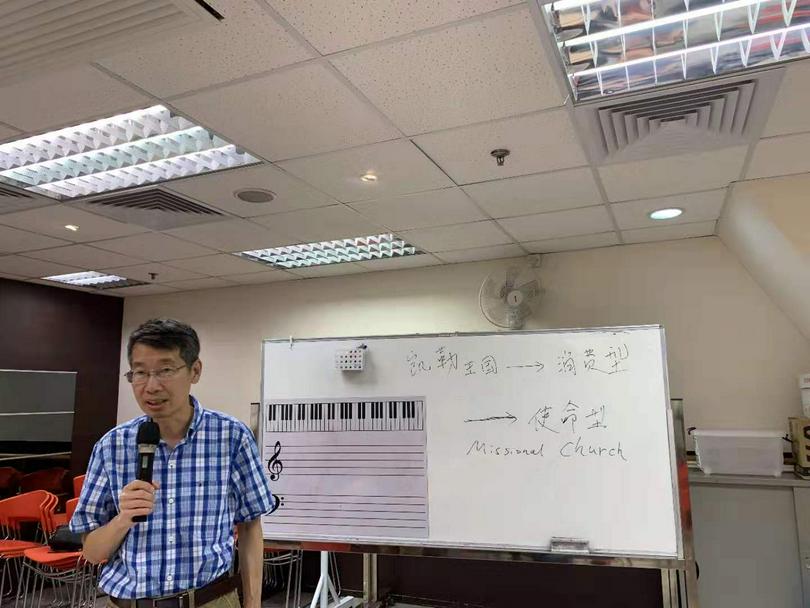From June 10 to 11, 2019, "Gospel and Modern China" magazine invited Professor Yao Xiyi to hold a two-day internal mini-lecture in Hong Kong, exploring the theme of how Chinese Christians and churches, in the current situation, should face and choose a path for the future.
On that theme, the lecture consisted of four specific sections: first, the status quo of the revival of Anabaptism in Europe and the United States; second, an introduction to the current situation of American Christianity and American Chinese Christianity; third, the influence of the dispute between fundamentalists and liberals in the Republic of China on the Chinese church today; fourth, the future trend and direction of Chinese Christianity.
Professor Yao graduated with a B.A. and an M.A. from the History Department of Nankai University, Tianjin, China, in 1984 and 1987, respectively. After graduation, he worked at the Institute of World Religions of the Chinese Academy of Social Sciences in Beijing. In 1990, he joined the Associated Mennonite Biblical Seminaries in Indiana, majoring in church history. He was baptized at the local Mennonite Church during his school days. In 1992, he obtained a Master of Theological Studies. From 1995 to 2000, he studied the history of missions and the history of Chinese churches at Boston University Theological Seminary and received his doctorate in theology. In 2003, he joined the Hong Kong Chinese Theological Research Institute and the Chinese Cultural Research Center Program of the Institute. Since 2012, he has taught at the Gordon-Conwell Theological Seminary. Professor Yao's masterpiece, "Debate for the Truth - The Fundamentalist Movement among Protestant Missionaries in China, 1920-1937", was published in 2008.
In this lecture, Professor Yao introduced the current situation of Christianity in Europe and the United States and the revival of Anabaptism. Through analysis of the three relationships between the church and the world, he highlighted three types of Christianity in Europe and America:
First, the religious kingdom-type church model: this model emphasizes the unity of politics and religion, and the ideal is to build a Christian kingdom;
Second, the super-large consumption church model: this model is a Christian version of contemporary secular consumerism. The ideal is to build a large-scale religious supermarket that provides all kinds of religious goods, for the sake of fame and fortune;
Third, a proactive mission-based church model: this type of church believes that Christians are the minority in society. Christians should follow the teachings of Christ and become disciples of Christ. They are active in the real society and are witnesses of the faith. This kind of mission-based church inherits the tradition of Anabaptism in history, and today's Mennonites are the main embodiment of this tradition.
After reviewing and discussing the history and current situation of Chinese Christianity, the professor believed that the future direction of the Chinese church should be the growth of mission-based churches. Christians should admit that they are the minority in this world. Although Christians do not pursue secular power, fame and fortune, they should not be self-enclosed and conservative, but should be active and promising to witness the Christian faith in society with respect to their various situations.
To this end, the Chinese church needs to have a clear understanding and reflection on many external influences and designs. Concerning these kinds of external influences and designs, there are two aspects that need special attention:
1. Be conscious of academic research and analysis, especially the religious sociology model from the Western situation. Regarding the current religious market theory that has a great influence on Chinese academic circles, Professor Yao believes that this is an analytical paradigm in the Western context that is often used to analyze the current religious status in China, leading to frequent misunderstandings;
2. Be wary of the top-level design of the future development of Chinese Christianity, because this top-level design is actually the top-level design of the Christian religious kingdom. The most influential aspect of this top-level design is the theory of three- dimensionalization and the growth of the number of Christians, all in the hope that China can become a Christian country. This kind of thinking will bring great harm to the healthy growth of the Chinese church.
During the seminar, participants were able to open up to each other, speak freely, fully communicate and discuss, and were deeply touched and inspired by Professor Yao's lectures, and hoped that such seminars will continue.












